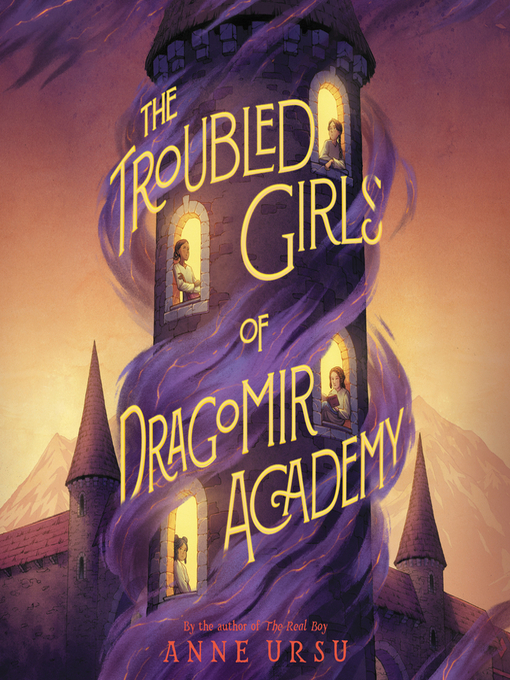Review by Booklist Review
In Illyria, sorcerers (always men) wield magic to keep people safe and thus hold powerful positions within the land. Therefore, it's a matter of life-changing importance when Marya's brother is pegged as having magic potential. Marya's only job during his magic assessment is to stay out of sight--a task at which she fails spectacularly. The disastrous visit results in Marya's getting sent to Dragomir Academy. With a motto of "Character above All," Dragomir houses girls from all walks of life in supposed need of discipline. Marya struggles to accept her new life there but embraces the opportunity to make friends and receive an education. A mystery of a missing girl is threaded through the school story line, which Marya investigates only to unearth a massive revelation about the school's true purpose. Ursu is heavy-handed in her feminist fantasy's critique of gender inequality, and that's not necessarily a bad thing. Readers present for the tale's magical trappings and interwoven intrigue won't be disappointed, and they'll welcome Marya's determination to assert herself as powerful in her own right.
From Booklist, Copyright (c) American Library Association. Used with permission.
Review by Publisher's Weekly Review
Though the patriarchal Kingdom of Illyria is known for its tapestries, the elegant visuals center men's experiences to the exclusion of women's: "Behind every great tapestry was a woman who wove it, just as behind every great sorcerer was a wife to tend to his domestic affairs." Likewise, pale-skinned Marya Lupu, 12, is expected to tend to her family's household, while her brother, 13-year-old Luka, receives the privilege and tutelage apparently befitting a prospective sorcerer. With the mysterious Dread increasingly devouring entire towns, the Council for the Magical protection of Illyria scours the countryside for magical talent that can help keep the Dread at bay--and should Luka become sorcerer, the change would confer status on the entire family. But after an incident occurs during Luka's test, Marya is summoned to Dragomir Academy, a faraway school that prepares "troubled" young women for a model future on sorcerers' estates while requiring them to forsake their pasts. Via a winningly curious protagonist who has a keen interest in the truth, Ursu (The Lost Girl) weaves a layered tapestry--filled with close-knit relationships and a well-explained, intriguing world--that questions authority, misogyny, and whom a story serves. Ages 8--12. (Oct.)
(c) Copyright PWxyz, LLC. All rights reserved
Review by Horn Book Review
Marya has been told that her brother is the important one in the family, destined for a powerful role in Illyria's all-male Sorcerers Guild, protecting the kingdom from the Dread, a curse that wipes out whole towns. When she and her unruly goat ruin her brother's audition for the Guild, it's terrible. But is it so terrible that Marya must be sent away to the unknown Dragomir Academy for Troubled Girls? Apparently so, and willy-nilly she's ensconced in a repressive school whose motto is "character above all" and where obedience, punctuality, and propriety rank as primary virtues. There's much Marya doesn't understand about the Academy, and at first her bumbling explorations into its mysteries are stonewalled by the smooth-talking headmaster. But as she investigates further, she uncovers the drastic measures the state-sanctioned Academy is taking to repress and destroy all female magic -- including the students' own. This is an accessible, timely school story with a rather Transylvanian flavor to its fantasy setting, not to mention a creepy realism in its portrayals of a cover-up and the destruction of women's power. Ursu (Breadcrumbs, rev. 1/12; The Lost Girl, rev. 3/19) explores girls' conditioning in timidity and shame in a male-dominated world and, ultimately, envisions a hopeful, female-determined future of magical ability. Deirdre F. Baker September/October 2021 p.108(c) Copyright 2021. The Horn Book, Inc., a wholly owned subsidiary of Media Source, Inc. No redistribution permitted.
(c) Copyright The Horn Book, Inc., a wholly owned subsidiary of Media Source, Inc. No redistribution permitted.
Review by Kirkus Book Review
In the kingdom of Illyria, the lives of young girls are of little consequence. Twelve-year-old Marya Lupu has always been told there is no place for her in the world, whereas her older brother, Luka, has been primed all his life to become one of the rare, respected sorcerers who protect the realm against the mysterious Dread and the wicked witches of Kel. A mistake lands Marya at the Dragomir Academy, an isolated boarding school for troubled girls, where she and her classmates are expected to reform themselves and leave the past behind. But the more time passes, the more the girls spot the holes in the fabric of the stories they are told. Through Ursu's hallmark thoughtful and inspiring writing, readers delve into a story that seamlessly combines intriguing worldbuilding that is full of magic with a feminist perspective that interrogates the systemic oppression at society's core. Marya's developing relationships with her classmates as well as with her brother form the beating heart of the book. But it's Marya's inner conflict as she asks the question, "Who does the story serve?" and considers what she has always been told about herself that elevates this tale into unmissable territory, with its remarkably raw and honest look at the emotional and psychological consequences of living under patriarchal ideology. Marya is pale skinned in a world with characters of varying skin tones. A wonderful and inspiring feminist fantasy. (map) (Fantasy. 8-12) Copyright (c) Kirkus Reviews, used with permission.
Copyright (c) Kirkus Reviews, used with permission.


